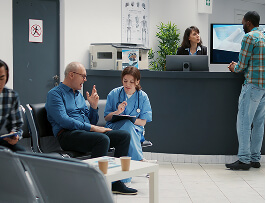Building a HIPAA-Compliant Digital Experience Platform for a Major Hospital Network to Personalize Patient Journeys
Industry Healthcare
-
$10B+ Client Revenues
-
12+ Successful Years
-
1000+ IT Ninjas
-
5000+ Projects
"The Developers.dev team was exceptional. They understood the unique constraints of the healthcare industry, from HIPAA compliance to WCAG accessibility. They didn't just build a website; they built a platform that has fundamentally improved how we engage with our patients. Their Healthcare Interoperability POD was instrumental in connecting the DXP to our EMR system."
Chief Digital Officer
Our client is a large, multi-state hospital network in the USA with dozens of hospitals, specialty clinics, and urgent care centers. Their existing web presence was built on an outdated version of Drupal that was difficult to manage, lacked modern features, and posed potential HIPAA compliance risks. They needed to create a unified, patient-centric digital front door that was secure, accessible, and capable of delivering personalized content and services.

The client's website was failing on multiple fronts. Patients found it difficult to find doctors or book appointments. The system couldn't deliver personalized content based on a patient's location or health interests. Furthermore, the underlying technology was a compliance nightmare, creating significant business risk.

All aspects of the platform, from data storage to user authentication, had to be fully HIPAA compliant.

The new platform needed to integrate with their existing Electronic Medical Record (EMR) system for appointment booking and patient data.

Delivering relevant content to millions of patients across different regions and service lines.

The site had to be fully accessible to users with disabilities, meeting WCAG 2.1 AA standards.

We proposed and built a comprehensive Digital Experience Platform (DXP) that put the patient at the center.
We upgraded and re-architected their platform using the latest version of Drupal, leveraging its robust security and content modeling features.
We integrated a personalization engine that used a combination of geolocation and user behavior to surface relevant doctors, services, and health articles.
Our Healthcare Interoperability POD developed a secure, HIPAA-compliant API layer to connect the DXP with their EMR system for real-time appointment scheduling.
Our Accessibility Compliance POD was involved from the design phase to ensure every component and user flow was built to WCAG 2.1 AA standards.
Began with a thorough risk assessment and compliance audit.
Co-developed a patient journey map to guide the UX and personalization strategy.
Designed and built a library of accessible, reusable front-end components.
Engineered the secure API integration layer with extensive testing and auditing.
Migrated and restructured thousands of pages of health content into a new, user-friendly information architecture.
Conducted extensive user acceptance testing with both internal stakeholders and patient focus groups.
The seamless EMR integration made it easier for patients to book appointments directly online.
Mitigated legal risk and made the site accessible to all members of the community.
Personalized content led to longer session durations and more page views per visit.
The new Drupal platform simplified content updates for the marketing team, reducing their reliance on IT support.

Our structured, CMMI Level 5 approach was critical for a project with such high stakes.
The project leveraged our dedicated Healthcare, Accessibility, and Drupal PODs.
AI tools helped analyze and categorize existing content for the new information architecture.
HIPAA and WCAG compliance were foundational to the project's success.
The new Drupal platform is open-source and highly extensible.
The successful EMR integration was the most complex and valuable part of the project.
The platform is ready for future integrations, such as telemedicine modules.
We held weekly stakeholder meetings to ensure alignment across all departments.
The site's performance and reliability were dramatically improved.
For the hospital network, this project was a critical digital transformation initiative. By partnering with Developers.dev, they were able to replace a risky, outdated website with a modern, compliant, and patient-centric Digital Experience Platform that serves as a model for the healthcare industry.